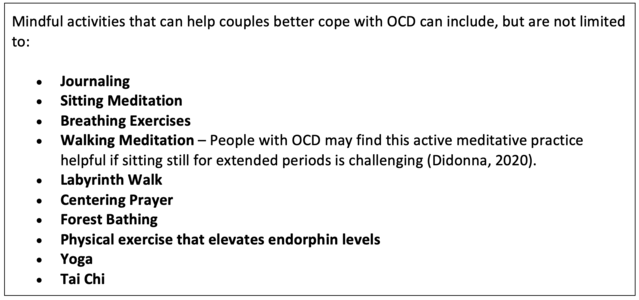OCD
Mindfulness and Obsessive-Compulsive Disorder (OCD)
Mindfulness can be a helpful tool to handle OCD in relationships.
Posted November 25, 2022 Reviewed by Ekua Hagan
Key points
- OCD can disrupt peace in relationships. Undesired intrusive thoughts based on unfounded perceptions of reality can lead to an erosion of trust.
- Mindfulness can help reduce OCD symptoms and nurture a sense of peace and well-being.
- Mindfulness can help caregivers recognize how they may be accommodating patients with faulty logic patterns.

Mindfulness has been a topic of discussion in clinical and public areas over the past few years. Since obsessive-compulsive disorder (OCD) can distress any marital partnership, anything that can offer ways to reduce the anxiety and stress that accompany OCD is worthy of consideration. In this post, we’ll examine what mindfulness is, the disruptive nature of OCD, mindfulness as a coping mechanism for couples, and partner support (Culkin & Culkin, 2021).
What Is Mindfulness?
Mindfulness is a state of self-awareness that allows us to monitor our thoughts and observe the continuous flow of cognitive processes. It entails the capacity to allow emotions to inform our responses to events or changes in our relationships, rather than reacting with feelings that can lead to destructive behaviors (Beverley, 2004/2008). In a way, mindfulness consists of thinking about thinking—or metacognition. By becoming more aware of what we think at various times, we can begin to see through raw emotions and identify "real" information upon which we can develop more accurate perceptions of reality. Beyond metacognition, mindfulness involves the recognition of the various filters we use to make sense of daily life. Mindfulness, in this sense, involves looking at something just as it is—without bias or preconception. If we adopted the mind of a child looking at something for the very first time, we would be in a mindful state.
How OCD Disrupts Peace in Partnerships
OCD is a disorder, as previously discussed, because it can disrupt peace in relationships—with self, friends, or partners. By highlighting a person’s egotistic obsessions, the disorder can delay growth in compassion for and communication with a partner. Undesired intrusive thoughts grounded in unfounded perceptions of reality can lead to an erosion of trust and empathy in any relationship (Clark & O’Connor, 2005). OCD tends to amplify doubts we can get when learning from our experiences through our senses, resulting in a false narrative about ourselves and our relationships. Abramowitz (2021) describes OCD as a con artist, making a couple believe they can solve a simple problem that, the more they "fix" it, becomes increasingly unsolvable and emotionally charged. As a result, the relationship becomes distressed over time, often without any relief.
How Mindfulness Can Help Couples Cope With OCD
Mindfulness can help identify misperceptions and thereby empower us to retell our narratives grounded in our senses rather than imaginary doubts. Meditative practices can help develop and preserve mindfulness by linking physical and mental relaxation. Mindfulness can help reduce OCD symptoms and nurture a sense of peace and well-being (Didonna, 2020, see p. 168).
Couples can use these mindful practices to change the rules and gain the upper hand over the OCD "con artist." By physically and mentally controlling one’s personal space through mindful awareness, one can begin to feel more confident—not only about themselves but also their partner. For example, by placing oneself in an upright and relaxed meditative pose, and conducting breathing exercises in a space that normally triggers obsessive thoughts (for example, germs in a bathroom), a person can begin to equate that space with centeredness and relaxation. Put another way, mindfulness activities can help us correct misperceptions of our own realities through open-mindedness and cultivated compassion.
Helping Partners Support Their Loved Ones
Mindfulness and other constructive activities don’t just help patients; they can also support loved ones who care for their partners. The same open-minded approach that can help correct faulty logic patterns in patients can also help caregivers recognize how they may be accommodating them. The wife of the man triggered by germophobic obsessions can meditate with him in the bathroom—the scene of the con. While he may more clearly identify his misplaced fears, she may discern how helping him ritually clean the bathroom only facilitates his compulsions. At the same time, the act of doing the activity together exhibits mutual support and encouragement along the long road of healing. Other activities that promote mindfulness, listed below, may likewise enable couples to cope with OCD.

Conclusion
While OCD can be a destructive force in relationships, tools such as mindful practices are available and can help reshape marriages. By examining the nature of mindfulness in your own life, you can choose to be more present to your partner and support them.
References
Abramowitz, J. S. (2021). The Family Guide to Getting Over OCD: Reclaim Your Life and Help Your Loved One. The Guilford Press. He addresses mindfulness in chapters 2-3.
Beverley, J. A. (2004/2008). Creating Loving Relationships: Living a Life of Authenticity. Aurora Canyon Publishing.
Clark, D., & O’Connor, K. (2005). Thinking is believing: Ego-dystonic intrusive thoughts in Obsessive-Compulsive Disorder. In D. Clark (Ed.), Intrusive Thoughts in Clinical Disorders: Theory, Research, and Treatment (chapter 6, pp. 145-174). The Guilford Press.
Culkin, D., & Culkin, M. (2021). OCD and Marriage: Pathways to Reshaping Your Lives Together. Specialty Press, Inc. This article is an adaptation of chapter 6. See https://ocdandmarriage.com.
Didonna, F. (2020). Mindfulness-based Cognitive Therapy for OCD: A Treatment Manual. The Guilford Press. See chapters 3 & 6-7.


